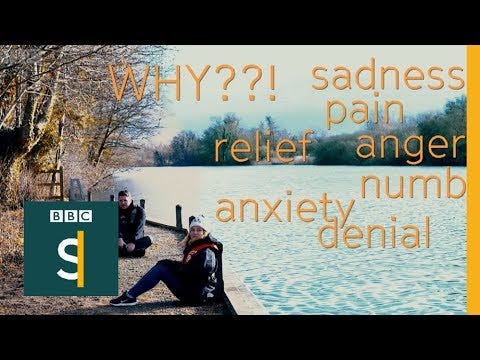Hello Dear Reader! A special welcome to our new Carer Mentor community members!
Thank you for spending some of your precious time and energy reading this article.
I’m Victoria. You can read why I’m publishing Carer Mentor here: Who Started Carer Mentor and Why?
In my article ‘A Prelude to Caregiving: Love and Torture’, I shared some painful experiences. The spin-cycle of anguish in 2015 was torture.
Dr Kristin Neff's work and insights and those of others like Dr Brené Brown and Dr Susan David resonate with me and help me manage and move through my mental load.
In this talk, I learned the difference between self-esteem and self-compassion and how to be kinder to myself.
I’m not a medic, psychologist or expert. I’m a perfectly imperfect human trying to navigate some extremely challenging times. I hope what helped me can offer you some support too.
Dr Kristin Neff and Dr Chris Germer
From their website:
Since 2010, Drs. Kristin Neff and Chris Germer have tested and continually refined strategies to help people develop self-compassion as a habit—a natural strength that comes to our aid whenever we need it. And guess what? It works. In research studies and in real life.
The website with free resources: What is Self Compassion, and what it's not.
Kristin Neff: ‘The Space Between Self-Esteem and Self-Compassion’
Key messages transcribed from the video:
Self Esteem: Global Evaluation of self worth. A judgement. For a long time it was seen as a marker of psychological health.
If Low self esteem - people are likely to be depressed and anxious
High self esteem can be problematic. It's not a problem if you have it but its about how you get it. In American culture this means you have to be special and above average.
It's not okay to be average in this culture. It's considered an insult to be average. So, if we all have to feel above average, 'we play these little games about puffing ourselves up of in comparison with others put them down. There is an epidemic of Narcissism in this culture.
Nasty social dynamics like bullying, prejudice - to enhance our own self esteem. Self esteem is contingent on success. What happens if we fail or don't meet those ideal standards, the domains we value?
For women around the world the number one domain that women invest their self esteem is their perception of how attractive they are.
Self Compassion is about relating to ourselves kindly, flaws and all. 3 core components.
1) Treating ourselves like we would a friend, with kindness.
2) Common humanity. Not how are we different from others but how are we the same. The shared human experience. Common humanity, instead of feeling separated from others. We are each an imperfect person. We are ALL perfectly imperfect.
3) Mindfulness. Being aware of ourselves, and what IS, in the present moment. We need to be able to turn toward, acknowledge, validate and accept the fact that we are suffering in order to give ourselves compassion. Often we aren't aware of our own suffering, especially when that suffering comes from our own harsh self criticism. We get so involved in our own self criticism that we don't realise the incredible pain that we are causing to ourselves, and if we don't notice what we're doing in our own harsh self criticism we can't give ourselves the compassion that we need.
Why do we do it, this harsh self criticism?
We believe we need our self criticism to motivate ourselves, we think we are too lazy and self indulgent and need it to do better. So the question is, is it true?
Actually research shows the opposite. It undermines our motivation. Harshly criticising ourselves taps into our threat defence system the reptilian part of our brain. This part of our brain evolved so that if there was a threat to our physical person it would release adrenalin, cortisol and prepare for the fight flight freeze response. The system was meant for threats to our actual physical body but modern times the threat is to our actual selves but to our self concept So when we think a thought about ourselves that we don't like or some imperfection we feel threatened and so we attack the problem, meaning we attack ourselves. AND with self criticism it's a double whammy because we are both the attacker and the attacked.
So self criticism releases a lot of cortisol. So if you are a self critic you have a high level of cortisol, a high level of stress and eventually the body to protect itself will shut itself down, and become depressed to deal with all the stress, which itself is not a motivational mind state.
There is another way for us to feel safe, and that's tapping into our mammalian caregiving system.
What is unique about mammals is that they are born very immature and therefore there needed to be a system so that babies stayed close to mothers. Which means are bodies are programmed to respond to warmth, gentle touch, and soft vocalisation.
So when we give ourselves compassion, the research shows we actually reduce our cortisol, we release Oxytocin and opiates which are the feel good hormones. When we feel safe and comforted we are in the optimal mind state to do our best.
Strong direct correlation between self compassion and Mental Wellbeing, and connectedness with others; interpersonal relationships.
Self compassion offers all the same benefits of self-esteem but without all the pitfalls. (no depression or narcissism or stress).
Self compassion is not selfish or indulgent. the more we can keep our hearts open the more we have to offer and give to others.
Here is the link to the website and Free resources:
These are the other videos which Kristen Neff offers on her website. I highly recommend exploring all her work.
Self Compassion
Self Kindness
Common Humanity
Mindfulness
Self Compassion vs Self Esteem
About Dr. Kristin Neff
From the website:
Kristin Neff, Associate Professor, Educational Psychology Dept., University of Texas at Austin.
Kristin Neff received her doctorate from the University of California at Berkeley, and is currently an Associate Professor of Educational Psychology at the University of Texas at Austin.
During Kristin’s last year of graduate school she became interested in Buddhism and has been practicing meditation in the Insight Meditation tradition ever since. While doing her post-doctoral work she decided to conduct research on self-compassion – a central construct in Buddhist psychology and one that had not yet been examined empirically. Kristin is a pioneer in the field of self-compassion research, creating a scale to measure the construct almost 20 years ago. She has been recognized as one of the world’s most influential research psychologists. In addition to writing numerous academic articles and book chapters on the topic, she is author of the book Self-Compassion: The Proven Power of Being Kind to Yourself, and her latest Fierce Self-Compassion: How Women Can Harness Kindness to Speak Up, Claim Their Power and Thrive.
In conjunction with her colleague Dr. Chris Germer, she has developed an empirically supported training program called Mindful Self-Compassion, which is taught by thousands of teachers worldwide. They co-authored The Mindful Self-Compassion Workbookas well as Teaching the Mindful Self-Compassion Program: A Guide for Professionals. She is also co-founder of the nonprofit Center for Mindful Self-Compassion.
Self-Compassion Articles
It’s reassuring to read of other people’s experiences, but especially from trained experts like
(Dr. Amber Groomes, a licensed clinical psychologist with a specialty in anxiety, obsessive compulsive disorder, and maternal mental health.)Common Humanity Articles
shares some beautifully articulate expressions and phrases of common humanity. Click through to discover more e.g. through the eleventh gem she links to her article that discusses ‘The antidote to depression is not positivity – it is fully feeling your sadness or shame or rage.’I thought I would gather together a few of the nuggets I have gleaned from over 23 years of sitting in the hot seat.
If you’re seeking support:
UK: MIND Crisis and Listening services If you need to talk right now, there are many helplines staffed by trained people ready to listen. They won't judge you, and could help you make sense of what you're feeling.
Six Articles related to ‘Managing the Mental Load’
Please ‘❤️’ LIKE the article
Please share if you think this could help others.
Carer Mentor by Victoria is free to read. If you have the means and would like to support the publication, I welcome monthly (£6) and annual (£50) subscriptions. Thank you for your ongoing support.














Yes! Big fan of Brene Brown and Kristin Neff. Life-changing reading and re-reading for me and their work has really helped me to cope with caring for my son and my Dad over the last few years - and myself in the middle!
Nice